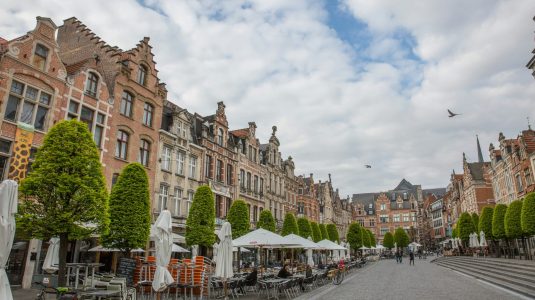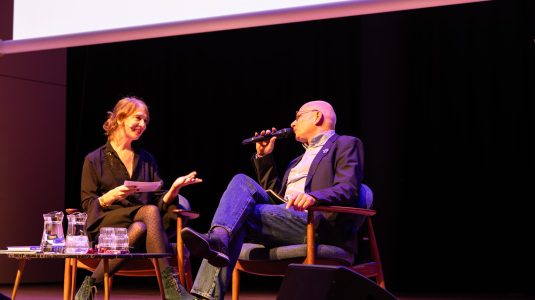VVOJ Conferentie 2004
Titel: Investigate yourself
Workshop: Tweede keynote speech
Sprekers: Nils Hanson (Uppdrag Granskning)
Datum en tijd: Vrijdag 19 november, 10.25 – 11.00 uur
Marjan Agerbeek: Our next speaker is Nils Hanson. He is the editor of Uppdrag Granskning. It is probably a program like Panorama, isn’t it Nils? Nils worked at a major regional newspaper as well as at small regional TV-stations. So he is familiar with the difficulties of managing several kinds of newsrooms and journalists. So please, share your wisdom with us, Nils. Welcome Mr. Nils Hanson.
Nils Hanson: I’m happy to be here. I was last week in Utrecht for the Blues estaffette. For the most famous and greatest blues festival in the world. And I always feel very comfortable in this country.
Investigate yourself. Is that really necessary? I mean, there are nicer things to do in life than to investigate yourself. And our job is to investigate others. Isn’t it? Sure it is. But in fact it is very wise for us to investigate ourselves. Because if we don’t do it ourselves, someone else will investigate us. Those days are gone where we could relax in our newsrooms knowing that we were the only one who can do the job. We have a totally new media situation. Thanks to Internet. So now we have to open our doors. We have to show openness. And we have to examine ourselves. We have to improve our safety culture. Nuclear power plants they have safety culture and I think we need that too. Just as nuclear power plants. Because what will happen if you don’t have a safety culture? I’ll tell you about what happened to us.
One evening in February, something changed for the program I’m working for. The name of the program is, as Marjan said Uppdrag Granskning. It means assignment investigation. This program broadcasts from Gotheburg on our Swedish West Coast. Has a staff of 40 people. We are on the air one-hour a week, 50 weeks a year. And we have newsrooms in 4 cities in Sweden. And as the title says, our job is to investigate and nothing else. As Uppdrag Granskning is a flagship of Swedish Television, the public service company. It’s a major force in Swedish journalism and its mainly focused on Swedish issues. But that evening in February something changed.
People started questioning us. Can we trust Uppdrag Granskning?
That evening we were investigated ourselves by a program called Media Magasinet. The media magazine. The colleagues, who were doing the investigation for this media critical magazine, those colleagues worked in the same TV house in Gotheburg, in the same corridor as us. In fact they were our nearest neighbours using the same copying machine and printing machine. In secret they started investigating us. Those nasty persons! And what did they find? Well, instead of investigative reporting, they found lousy reporting. I’ll show you a short clip. Just to give you an impression of what it’s about.
Geluid van een filmpje:
Zweedse tekst.
Eh stop there. I can’t take more than that. That is enough. Yeah, what did they find? Well as I said, lousy reporting instead of investigative reporting. I give you just one example.
In a story about crime amongst officers in a Swedish military force, we did uncover that the officers where sentenced for crime more than others. And that was really an interesting story, caused big headlines in the newspapers. Great story. The Media Magazine investigated this and what did they find? They found that women were included in the statistics for the people which the officers were compared with. And we all know that women are sentenced for crime less than men are, and we also know that there are very few women among the officers. What the Media Magazine revealed was in fact that the Swedish officers are more honest than others. They are sentenced less than Swedish men in general. We told our viewers that the officers had a worse crime record. The truth was the opposite. We cheated, we fooled our audience. How could we? I would like to think that this is an example of incompetence and not manipulation. This and other examples of lousy reporting caused a huge reaction among viewers, among colleagues and not at least, the management of Swedish Television reacted. Can we trust you? Is the flagship sinking now?
Well this happened in February this year. I had been in charge for this program for two months. No one could blame me for these shortcomings. But I had to handle the consequences. And in fact, I thought this could gain my work as an editor for this program. Because when I started out one year ago, I found some major problems with this program and the way that this staff is working. I found the same problem that I found at other newsrooms I’ve been working at. The problem that is serious enough anywhere. But even more so at an operation like this. I mean we’re often hurting people. We’re hurting people with our journalism. What is the problem? What is the problem then?
You know we spent so much time to produce our stories and so little time to check that we are right. How come? I mean it should be the most important of things to check that you are right. To examine yourself. How come? I don’t blame the reporters. I blame the editors, I blame myself. I think editors in general are too passive, or maybe lazy. We are interested in talking about the story, that’s for sure. But we are not interested in doing this tiresome fact checking. Few of us want to act like the devil’s advocate. It’s so much easier to leave it all up to the reporter. Why bother, when you don’t take any risks by doing this? I mean in the States, it costs you a fortune, astronomic amount of money when you are wrong and you get compensation claims. In Sweden it costs almost nothing. Except your reputation and that is bad enough of course.
I think lack of sanctions is one major reason that causes this problem. And as I said, this might pass when it comes to traditional news reporting or daily journalism as I like to call it. But it is not acceptable for us. We have to be more correct, more precise and fairer than any other journalists are.
What was the problem now with assignment, investigation or Uppdrag Granskning? The problem was that we had, we had and still have, very strong powerful reporters used to not being questioned. I found an organisation where the distance between editors-story and broadcast was very short. No control stations. The fact checking was the responsibility for the reporter himself or herself. The reporter delivered and is was supposed to be correct. That’s it. As easy as that.
In fact in a document concerning Uppdrag Granskning I read a sentence, one line, concerning fact checking. ‘We are always right.’ Period. Easy like that. Of course with that attitude you might get into trouble sooner or later.
When I started out a year ago as the new editor, I decided to make this a major issue for me this year, to establish a safety culture. My ambition was to do this step by step. But under the pressure, of this Media Magazine investigation, I decided to do it immediately. And the first and most important thing for me to introduce was what we call line by line editing.
Well, the story looks great. But is it right? That’s the question. The editor and the reporter form a team to find out. They sit in a room, lock the door, throw away the keys, turn off the cell phone, this work takes concentration. The editor questions the reporter. And remember, this has nothing to do with mistrust. We have a work to do together. Here are four questions that we ask. We go line by line. All facts correct? Of course. Simple as that. We go over every word, every line to check for accuracy. When the editor asks for it, the reporter has to show original documents. And it doesn’t matter how accurate this report is, we always find something wrong. Little details maybe, but still something wrong. A name can be spelled wrong or so. But if you are wrong, you know this can always be turned against you.
The reporter says it was a hot sunny day, that first day on May. The editor asks, how do you know that? The reporter says: “Well, he said so.” And the editor says, go and check that. And then maybe the reporter finds that, find that it was a cold and rainy day, that first day of May.
This is a tricky one, but it’s very important. How do you check absent facts? Facts that should be there, but are not. As an editor you are depending on the honesty of the reporter. Which of the facts have you thought of including but decided not to? Anything that you are not feeling comfortable with, tell me now. This works takes trustful co-operation between the reporter and the editor. Investigative reporting is not only about collecting facts. It’s also about telling what this fact means. It’s about conclusions. And without conclusions this journalism would be harmless or at least very very boring. Conclusions should be grounded on documents and other sources. Conclusions can be controversial. And if we don’t examine our conclusions before publication, someone else will do it afterwards. You can be sure of it.
This is an interesting one. You have to let the object of the investigation comment on all serious allegations. If the target is criticised for aspect A, B, C and D it’s not fair to only let him comment on A, B and D. What about C? You cannot leave that out. And it doesn’t hurt if the target gets a lot of space to comment on things in the story. If you don’t give him or her a chance to respond on all serious allegations. Recently, one of my reporters said: “I hate line by lining. But I love to have it done.”
Was it Winston Churchill who said: “I hate to write, but I love to have written.”
This autumn we have been working on an ethical code for our work in the newsroom. And the purpose with this is to improve our journalism, refine our methods and techniques. This work has been going on since spring, we have ten people working with it: editors, reporters, researchers, and photographers. And I admit it has been a hard road. It is not easy to tell journalists when it comes to how to do journalism. For one thing, journalists don’t like rules, I don’t do either. So we call it guidelines. And I really think we need these guidelines. They remind us about things that some might say are obvious. But reality shows it’s not obvious. And something I learned as an editor is that nothing is obvious. Even the most experienced investigative reporter make unnecessary mistakes. Guidelines can prevent mistakes. And they are an important tool. Every new investigative project gives us new experiences, new knowledge. That is something to take care of. And we can even use failures to refine our methods. Our document with this ethical code will be ready next month, I hope. And I would like to give you some examples of our discussion.
Hypothesis. That is something that scientists talk about. And like scientists we also formulate a hypothesis. Sometimes we are so sure that as a starting point we have a thesis, more like a statement. Which the scientists never do. But I think that is something we should be open with. We are journalists, we are not Nobel Prize aspirants. And we are not quoting machines, reporting all available information. We are journalists telling a story.
Do we have something to learn from the scientists? Yes, I think so. During the research it’s very important to question the hypothesis. To test it. Not prove it. If we push the hypothesis too hard in the beginning of an investigation it’s obviously a risk that we only are interested in those facts that verify our hypothesis. Not interested at all in those facts, those disturbing facts that really are not verifying but falsifying it.
I worked as a newspaper reporter for many years. Investigative reporter and at a newspaper -at least for myself. I talk for myself now- I often contacted the target, the object of the investigation, maybe just a couple of days before publication. For some reason I was afraid that this person could destroy everything if I contacted him or her earlier. That’s crazy and it’s also very risky. That can lead to serious complications before publication. I know, because I have experience of this. What could happen? The target might have explanations that you didn’t know about and that you have to examine under pressure of deadline. The target may give you new facts which you can not dismiss and which you have to check under deadline pressure. And besides that, the target is not given a fair chance to respond to obvious allegations if you don’t give the target enough time. You have so much time doing your research, you’re job. And the target gets so little time. Is that fair? I don’t think so. Now I work, I’ve been working for TV now for eight years and I’m a little bit wiser now, because in TV, you know, the confrontation is an important part of the story, of course. But TV is also much more complicated. It takes much more time to produce a story for TV. And in my program we often contact the key persons, we’re doing key interviews weeks, maybe months before publication. And we give the targets time to prepare themselves. There are exceptions of course. Especially if we expect the target to run away. Then we might ambush, make an ambush. But otherwise I think you can only benefit from early confrontation. You will get an effective test of your hypothesis, you will get an effective test of facts and you can get missing pieces in the puzzle. Because now we are talking with a real expert.
This is something we had tried to start with, really to help the target. You know sometimes it’s impossible to get hold of the target. It’s even impossible to get the target on the phone. The target has just disappeared. In that case it’s really tempting to demonise the target. To make him or her look so bad. Instead I think we should help the target to try to make the target comprehensible. Which arguments does this person have? Which explanations does this person have? Maybe we can find it in the documents. We should make efforts to present the facts that are of this person’s advantage.
In almost every good investigative story, you have victims, you have a good guy, and just as hard as we are against the bad guys, the target, just as soft we are against this good guy. Oh, you really mean that? Oh, so bad. What a pity. Oh, really? But the credibility of this person does not gain from that. Treat this person with respect by asking straight honest questions. Is it really that bad? What have you done to improve the situation? Because the viewers, the listeners or the readers, will ask those questions anyway. Stay critical against everybody. And your story will be trustworthier.
Sometimes we do real tough reporting. You had to use hard-edged methods. And these methods can be turned against you. If you make an ambush. If you use hidden camera. If you knock on the door at people’s homes. The sympathy might move from you to the target. You, the reporter, will be the bad guy. You can prevent this by explaining why you use this method. Why is it important to get this answers? Which efforts have you made to get these questions answered?
Sometimes we are criticised for unfair editing. By publishing the whole, unedited interview on the web, people can check us. This will give the audience a tool to examine us. This is an openness I think the people will expect of us in the future. And of course this will make the job more demanding for the reporter. You have to discipline yourself. Every second of the interview can be published. We have not started out with this yet. But we are getting in that direction now. Because we are questioned all the time. I think this is the best way to answer that. That is openness and that gives the audience the possibility to investigate us.
For every story we do on TV, we give a detailed description on the web. Which methods we have used, how we got the idea, which sources we used, a selection of all the documents, statistics and so on. It is not only useful for the visitors on our website, it also makes it more interesting for the reporters to document their own work. And it’s a way to transfer knowledge to other reporters and members of the staff.
This is the most difficult one:
Journalists and especially TV people are really not willing to admit mistakes. But this is something that our audience more and more is expecting from us. And there are a lot of watchdogs out there wanting to bite us as soon as they can. Of course we should try to precede this by setting a good example. But I have to be honest, we are not there yet. We still don’t call out our mistakes. But we are trying. We have started out, we have a column on our website where we do small corrections, detail corrections and we have in TV told our viewers about mistakes we have done. And these mistakes, we have revealed ourselves. We revealed them ourselves. And we told the viewers we had made a mistake in the last program. And the reactions so far? Positive!
Okay, you might now want to know: Is the flagship still sinking? Well: no, it’s safer than ever. This autumn we had an investigation that really had an effect in the Swedish society. That’s fantastic. We had an investigation on the former Swedish communist party, the left party. One of the biggest political parties in Sweden and we could reveal, we could uncover… what did we uncover? Ha ha ha. We could uncover improper relations between the leading party members and the former eastern embassies, DDR embassy in Sweden for example. The leaders were going there on vacation paid by the DDR embassy for example. We could also show that the new leader of this party is still a communist of the older type. So, that was really a story that has meant a lot for us.
I have given you some examples from our work establishing a safety culture in the newsroom. I don’t know much about the situation here in the Netherlands, but I suspect it’s about the same. All I can say is: for your own sake, investigate yourself!
Thank you very much.








